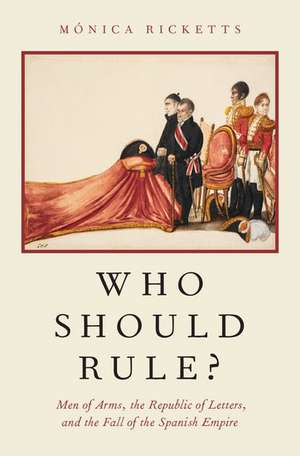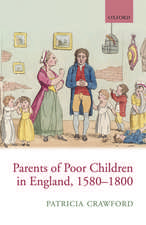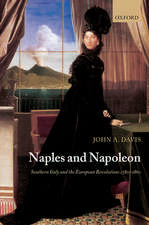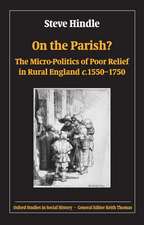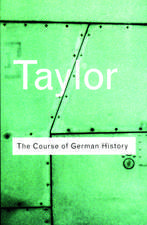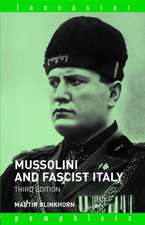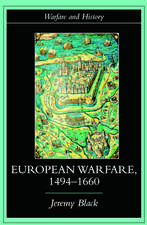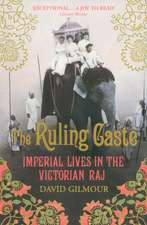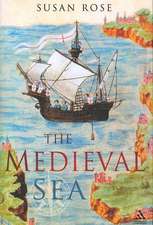Who Should Rule?: Men of Arms, the Republic of Letters, and the Fall of the Spanish Empire
Autor Mónica Rickettsen Limba Engleză Hardback – 14 sep 2017
Preț: 499.88 lei
Preț vechi: 714.92 lei
-30% Nou
Puncte Express: 750
Preț estimativ în valută:
95.68€ • 98.60$ • 80.77£
95.68€ • 98.60$ • 80.77£
Carte tipărită la comandă
Livrare economică 19-25 februarie
Preluare comenzi: 021 569.72.76
Specificații
ISBN-13: 9780190494889
ISBN-10: 0190494883
Pagini: 328
Ilustrații: 19 hts
Dimensiuni: 236 x 160 x 31 mm
Greutate: 0.57 kg
Editura: Oxford University Press
Colecția OUP USA
Locul publicării:New York, United States
ISBN-10: 0190494883
Pagini: 328
Ilustrații: 19 hts
Dimensiuni: 236 x 160 x 31 mm
Greutate: 0.57 kg
Editura: Oxford University Press
Colecția OUP USA
Locul publicării:New York, United States
Recenzii
...Ricketts's book...re-center[s] the history of ideas (and the actions they spurred).
A fascinating account of the many roles of intellectuals including the political position of men of letters in both Spain and the viceroyalty of Peru ... Ricketts ... shows that the struggle between men of letters and officers intensified after independence, with the definition of merit playing a key role. The violence of the period, both in Spain and in Spanish America is emphasized. An excellent work on the nature of self-styled elites ... it deserves much praise.
Who Should Rule? is impressively broad in both its temporal and geographic scope. Ricketts's approach grants equitable attention to both Spain and Peru, while tracing connections and interactions of peoples and processes between the two regions.The book is exhaustively researched, reflecting intense archival investigations on both sides of the Atlantic.Ricketts usefully complicates our understandings of the Bourbon Reforms and makes a valuable contribution to our comprehension of elite politics.
Ricketts's analysis provides a nuanced depiction of Spanish (and Spanish American) liberalism that goes beyond constitutionalism and emphasizes parallel developments in Peru and Spain. It explains educational transformations, chronicles new public discourse, and depicts the rise of new political actors, all with a refreshingly transatlantic lens. Specialists and students of the Spanish Empire and its legacies will find their interest piqued by the book's many instructive individual examples.
...an interesting, well-researched and clearly written book...Monica Ricketts's book should be welcomed for several reasons: for delving ´ into the Peruvian case from a political and intellectual (life) point of view during the transition from colony to independence, for a comparative perspective that takes into account the crucial events that took place in the metropolis from 1808 onwards (a perspective that was ignored for a long time by Latin American historians), and also for putting on the table of historiographic debate the highly complex relationship between the sword and the pen in the mundo hispanico during a time of reform, of revolution and of war that represents the birth of independent political life in Spanish America.
A fascinating account of the many roles of intellectuals including the political position of men of letters in both Spain and the viceroyalty of Peru ... Ricketts ... shows that the struggle between men of letters and officers intensified after independence, with the definition of merit playing a key role. The violence of the period, both in Spain and in Spanish America is emphasized. An excellent work on the nature of self-styled elites ... it deserves much praise.
Who Should Rule? is impressively broad in both its temporal and geographic scope. Ricketts's approach grants equitable attention to both Spain and Peru, while tracing connections and interactions of peoples and processes between the two regions.The book is exhaustively researched, reflecting intense archival investigations on both sides of the Atlantic.Ricketts usefully complicates our understandings of the Bourbon Reforms and makes a valuable contribution to our comprehension of elite politics.
Ricketts's analysis provides a nuanced depiction of Spanish (and Spanish American) liberalism that goes beyond constitutionalism and emphasizes parallel developments in Peru and Spain. It explains educational transformations, chronicles new public discourse, and depicts the rise of new political actors, all with a refreshingly transatlantic lens. Specialists and students of the Spanish Empire and its legacies will find their interest piqued by the book's many instructive individual examples.
...an interesting, well-researched and clearly written book...Monica Ricketts's book should be welcomed for several reasons: for delving ´ into the Peruvian case from a political and intellectual (life) point of view during the transition from colony to independence, for a comparative perspective that takes into account the crucial events that took place in the metropolis from 1808 onwards (a perspective that was ignored for a long time by Latin American historians), and also for putting on the table of historiographic debate the highly complex relationship between the sword and the pen in the mundo hispanico during a time of reform, of revolution and of war that represents the birth of independent political life in Spanish America.
Notă biografică
Mónica Ricketts is assistant professor of history at Temple University.
